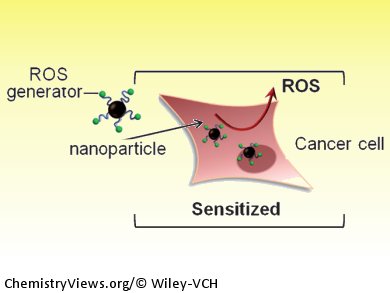Magnetic nanoparticles generate heat following exposure to a magnetic field. This property has been exploited to kill cancer cells as heat provokes apoptosis, a programmed cell death. In order to achieve a therapeutic effect, however, it is necessary to expose tumors to high temperatures which can be detrimental also for normal tissues.
Dongwon Yoo, Yonsei University, Korea, and colleagues report a way around this problem. The researchers conjugated Zn0.4Fe2.6O4 magnetic nanoparticles to gadolinium(III) texaphyrin, a porphyrin which induces reactive oxygen species (ROS) in cancer cells. The generation of this oxidative stress rendered tumor cells more susceptible to apoptosis when using magnetic heat treatments at 43 °C, a temperature that does not affect healthy cells. When delivered to cancer-bearing mice, these nanoparticles effectively reduced the tumor growth.
Thanks to this strategy, it is possible to achieve an efficient heat-induced apoptosis of tumor cells even at mild temperatures.
- Double-Effector Nanoparticles: A Synergistic Approach to Apoptotic Hyperthermia,
D. Yoo, H. Jeong, C. Preihs, J. Choi, T. Shin, J. L. Sessler, J. Cheon,
Angew. Chem. Int. Ed. 2012.
DOI: 10.1002/anie.201206400




